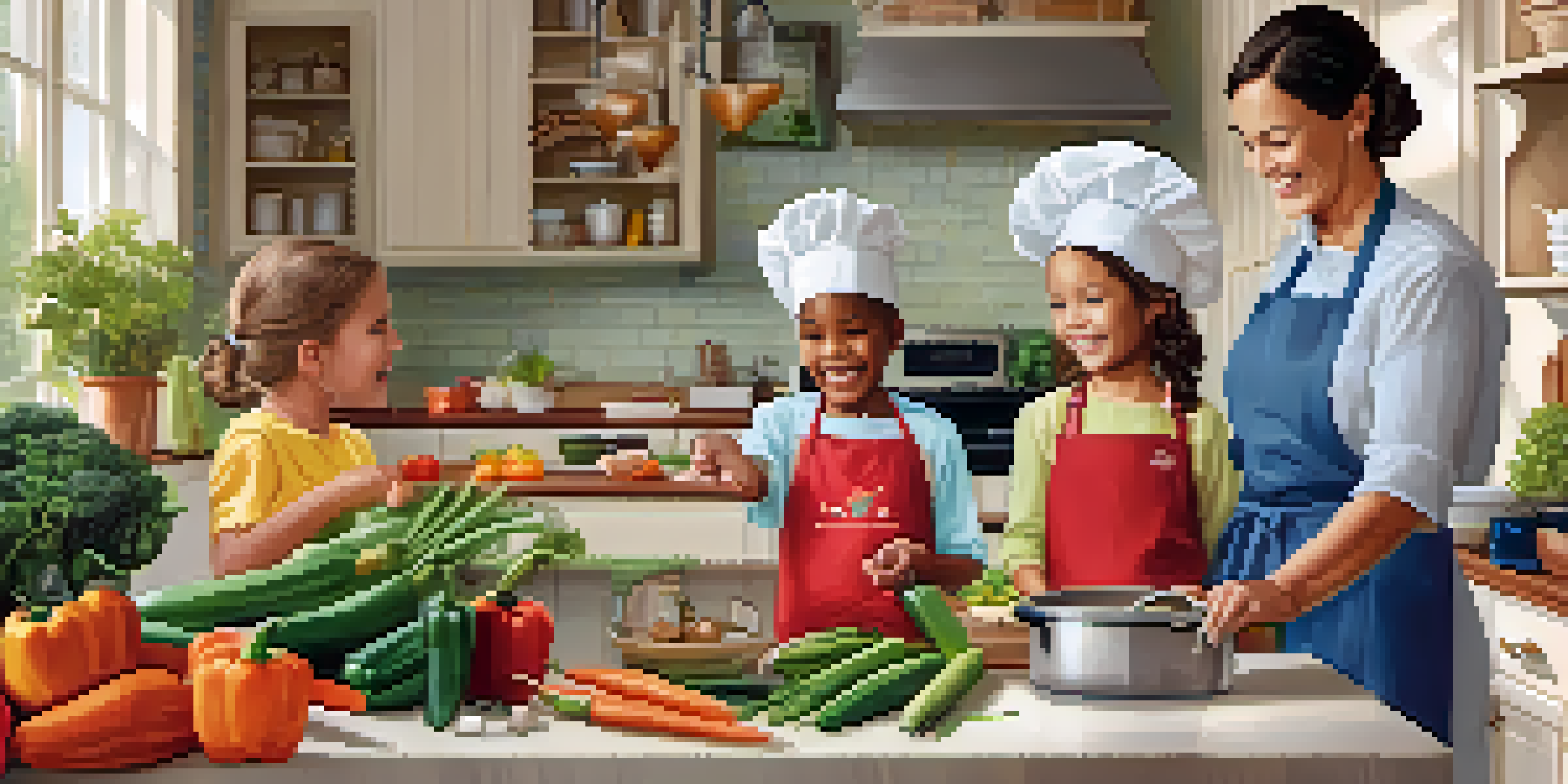Encouraging Family Participation in Vegetarian Cooking

The Benefits of Cooking Together as a Family
Cooking together as a family creates opportunities for bonding and collaboration. When everyone pitches in, it becomes less about the meal and more about the shared experience. Kids especially learn valuable skills like teamwork and communication, which are essential in everyday life.
Cooking is like love. It should be entered into with abandon or not at all.
Moreover, preparing meals together can lead to healthier eating habits. By engaging in the cooking process, family members can better understand nutrition and the benefits of vegetarian ingredients. This knowledge can foster a deeper appreciation for food and encourage more conscious eating choices.
Finally, the kitchen can turn into a fun, creative space where families express themselves. Experimenting with colors, flavors, and cooking techniques not only sparks creativity but also allows for personal stories and traditions to be shared, making meal prep a truly enriching experience.
Start with Simple Vegetarian Recipes
When introducing vegetarian cooking to the family, it's best to choose simple recipes that everyone can manage. Think of dishes like vegetable stir-fries, pasta primavera, or hearty bean soups. These meals require minimal ingredients and allow for plenty of customization, making them perfect for young chefs in the making.

Encourage everyone to pick a recipe that excites them. This participation fosters a sense of ownership, making family members more likely to enjoy the cooking process. Plus, seeing their favorites come to life in the kitchen can ignite a passion for healthy eating.
Bonding Through Family Cooking
Cooking together fosters teamwork and communication, creating valuable family connections.
As you work through these recipes together, take the time to explain the benefits of each ingredient. For instance, discussing the nutritional value of quinoa or the versatility of chickpeas can make the cooking experience educational and enjoyable.
Make It a Fun and Interactive Experience
To keep the cooking experience engaging, turn it into a game or challenge. For instance, you could have a 'mystery ingredient' contest where each family member must create a dish using a specific vegetable. This kind of playful competition not only brings excitement but also encourages creativity in the kitchen.
Food brings us together, and it is the ultimate expression of love.
Incorporating music or themed dinner nights can also add an element of fun. Choose a cuisine from a different culture, play related music, and dress up for the occasion. This immersive approach makes the cooking session feel like a special event.
Lastly, don't forget to celebrate the finished meal together. Setting the table nicely or creating a family buffet can elevate the dining experience, making everyone feel proud of their contributions to the meal.
Involve Kids in Meal Planning
Encouraging kids to take part in meal planning can significantly boost their interest in cooking. Have family meetings where everyone can share their favorite vegetarian dishes or suggest new recipes to try. This collaborative approach not only empowers children but also allows them to express their preferences.
By involving everyone in the planning stage, you can introduce a variety of ingredients and cuisines. This exposure helps children develop their palates and become more adventurous eaters. Plus, they may surprise you with their choices!
Engaging Kids in Meal Planning
Involving children in meal planning enhances their interest in cooking and encourages adventurous eating.
As a bonus, teaching kids about grocery shopping can be a valuable lesson in budgeting and nutrition. Allow them to help create a shopping list, and let them pick out fresh produce at the store. This hands-on learning experience can deepen their connection to food.
Create a Family Recipe Book Together
A fantastic way to document your family's culinary adventures is by creating a family recipe book. As you experiment with different vegetarian dishes, encourage everyone to contribute their favorites. This not only preserves cherished recipes but also engages everyone in the cooking journey.
You can make it more interactive by including notes, photos, and even stories related to each dish. Maybe there's a funny memory tied to a failed recipe or a holiday tradition associated with a particular meal. These anecdotes add a personal touch and make the recipe book a cherished keepsake.
Additionally, this project can serve as a fantastic bonding activity. Spend time together designing the book, discussing layouts, and deciding how to organize recipes. This process itself can be just as enjoyable as the cooking.
Explore Local Farmers' Markets Together
Visiting local farmers' markets can be an exciting family outing that enhances your vegetarian cooking experience. These markets offer fresh, seasonal produce and a chance to learn about where food comes from. Engaging with local farmers can also spark conversations about sustainable practices and the importance of supporting the community.
Make it a fun scavenger hunt by giving each family member a list of items to find. This not only encourages exploration but also makes the trip more interactive. They can discover new fruits or vegetables that they want to try cooking at home.
Creating Lasting Culinary Memories
Documenting recipes and experiences in a family recipe book preserves cherished memories and strengthens bonds.
When you return from the market, involve everyone in preparing the fresh produce. This step reinforces the idea of farm-to-table eating and helps family members appreciate the effort that goes into growing food.
Celebrate Your Cooking Successes Together
Every cooking experience, whether successful or not, is a step toward building culinary skills. Celebrate your achievements by having a family dinner where everyone showcases their creations. Highlight the dishes that turned out well and share what you learned from any mishaps.
Creating a 'Cooking Night' tradition can be a fun way to keep the momentum going. Set aside a specific night each week for family cooking sessions, where everyone takes turns leading the meal prep. This not only builds anticipation but also reinforces teamwork and accountability.

Finally, don't forget to enjoy the fruits of your labor together. Sharing a meal that you all contributed to creates a sense of accomplishment and strengthens family bonds. Plus, it allows for moments of laughter and storytelling around the table.